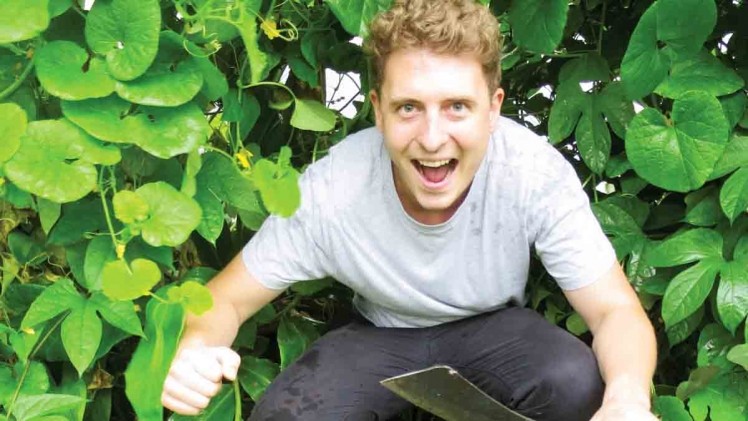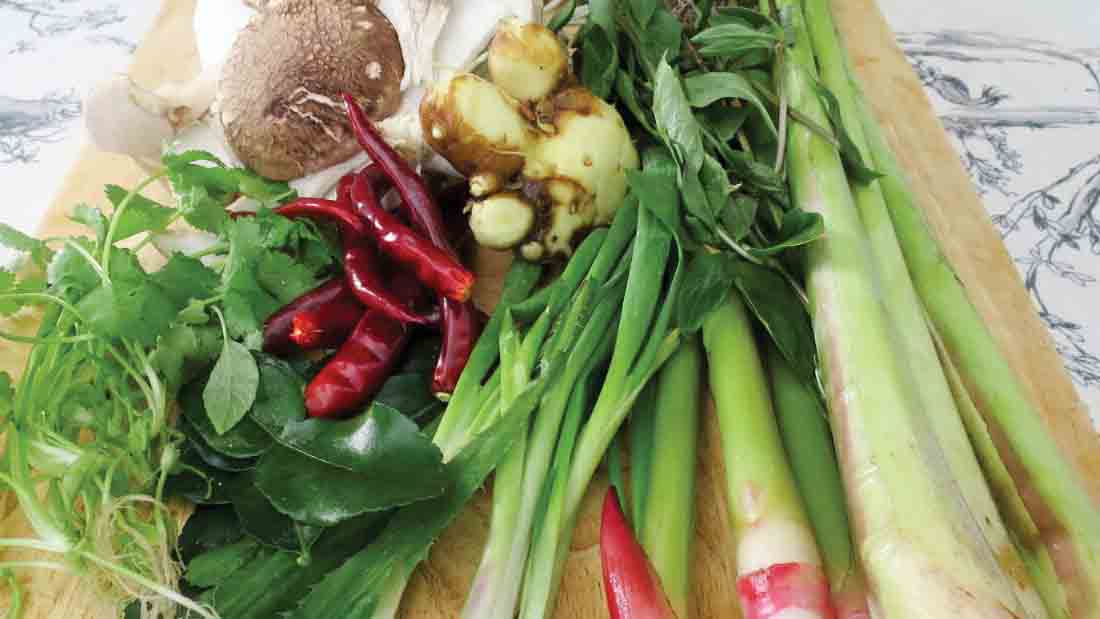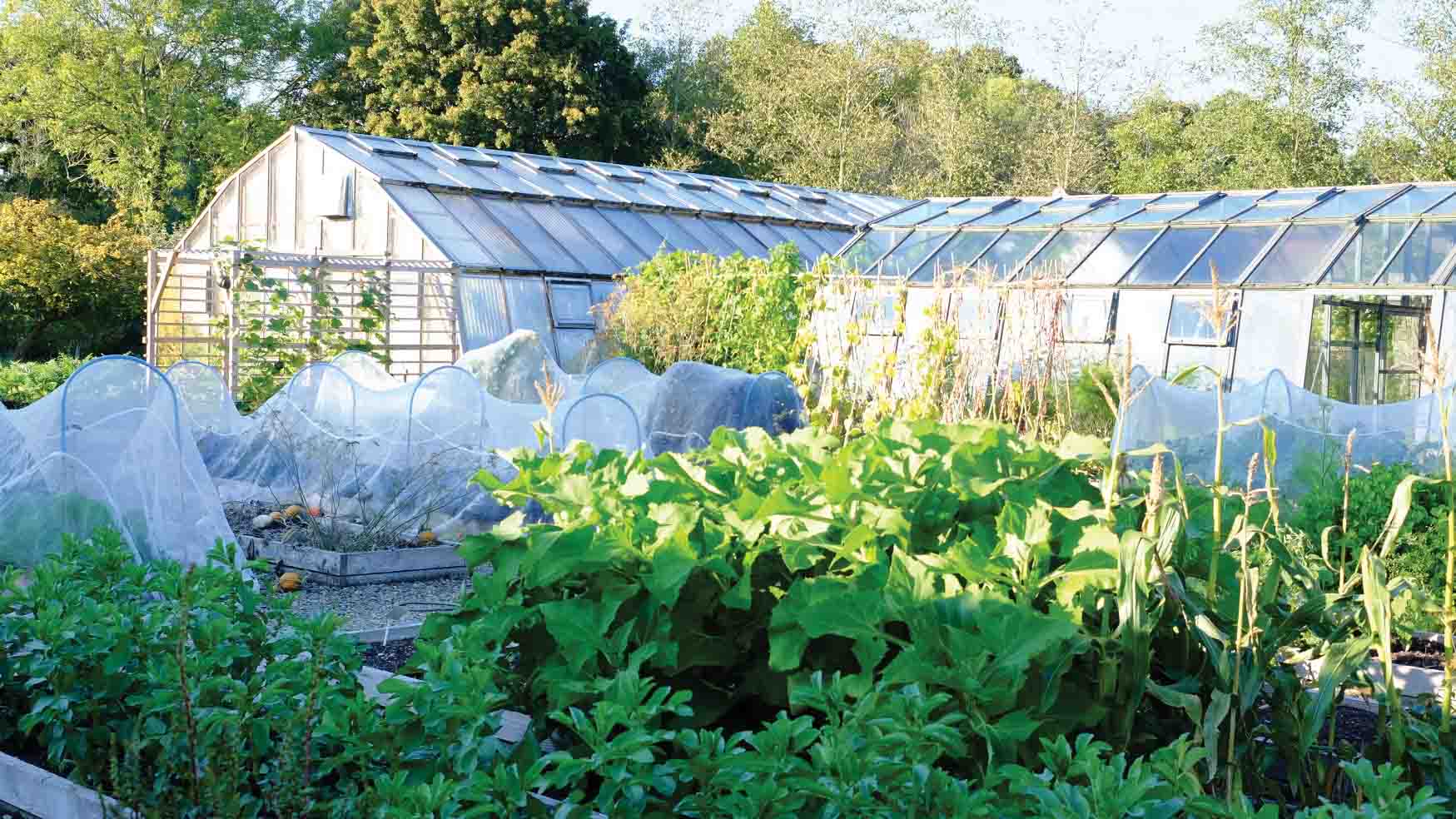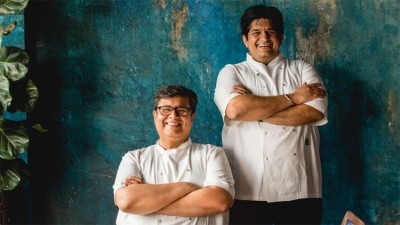King of the jungle: meet the chef growing Asian ingredients in Dorset

Som Saa. Kiln. Farang. Smoking Goat. Begging Bowl. The contingent of new-wave south-east Asian restaurants has been setting down roots throughout the capital during the past few years, moving away from the conservative and Anglicised dishes the country has grown accustomed to. The new names on the scene take a more ingredient-led approach to their menus: raw pastes, pungent roots, and fresh, pokey herbs that the British palate does not encounter often.
Yet diners might be surprised to find out the most unusual and exotic ingredients, the unfamiliar flavours that set these restaurants apart from the same-olds, often haven’t come from far-flung locations. Instead, many come from closer to home – Dorset, in fact – grown by former Salt Yard chef Luke Farrell. Farrell runs a tropical growing operation; an edible jungle to the diner or chef, but a “living library” to him at Ryewater Nurseries, in Dorset.
Smoking Goat and Kiln founder Ben Chapman was inspired by a trip to Thailand for his Thai-inspired London restaurants but, if asked, many of the aforementioned new-wave Thai restaurant chefs would be likely to credit David Thompson, founder of Nahm, for piquing their interest in the particulars of south-east Asian ingredients. Most of them have at least one staff member in the kitchen who has worked (or taken a stage) at Thompson’s restaurants, either at the now-closed and much-missed London outpost or the soon-to close Thailand iteration.
“There’s a whole army of David Thompson protégés out there,” jokes Farrell. “I knew the Thai thing would take off after David. It just had to.”
Farrell started his career in product design, before quickly segueing into the restaurant scene. His father had shares in Spanish/Italian restaurant Salt Yard, which is where he started out with a part-time job. Yet instead of honing his European cooking skills, he soon took off to south-east Asia, picking up skills from home and street cooks and strengthening his knowledge of the region’s cuisine.
Back in the UK, he started to grow his own chillies in a greenhouse on his family’s land in Dorset alongside his father, lepidopterist Clive Farrell’s butterfly farm. Staying true to Thai authenticity just wasn’t feasible with the UK’s limited south-east Asian produce, so the operation started as a personal project.
“I just wanted it for my own cooking, really,” he recalls, although once David Thompson heard about it, Farrell began to get requests.
“My dad went for lunch at Nahm, and took a box of my produce to David to show him what I was doing. He called me up, and asked me to grow some things for him. He is such a force in the Thai field, so I went to meet him in Thailand. He told me he needed all this stuff for London and no one could get it.”
What followed was a trip to a Thai plant market with Thompson’s head chef, Adam Lee Cliff. The shopping list included, among other things, mango trees, papayas, banana trees, and kaffir limes, all of which made their way to England to form the early stages of Farrell’s Dorset jungle. They came in the form of seeds and cuttings, and many of the first arrivals to the project are still growing now.
A living library
What started as a small operation has grown considerably in the eight years since its inception. Ryewater Nurseries now consists of three lofty greenhouses, the first of which acts as a comprehensive living library, formed of as many south-east Asian herbs as Farrell has had time to grow in this country.
“The first greenhouse isn’t set up to be commercially cropped,” he says.
“It’s for chefs to come down and have a look. We try a few things, take them into the development kitchen, and if they find something they like or want then I’ll do a run of it in one of the other greenhouses.”
In some cases, if a restaurant wants a large quantity of something unusual, (“like, say, horse tamarind”) Farrell will send it down to another grower in Cornwall, who will do a run of it for him in polytunnels while he works on other projects.
The plants themselves made their way from south-east Asia in the form of cuttings, for the most part by way of an “underground network of tropical plant hunters”, which is the most that Farrell will say on the matter. Export laws are fairly relaxed from most of the countries his crops come from… but he doesn’t want to be “put on a list”, he jokes.
From a handful of chillies, Farrell’s inventory of ingredients has expanded considerably. He now keeps more than 200 varieties of plants in the greenhouses, the majority of which are not found elsewhere in the UK.
“I grow very specialist ingredients,” he says.
“I like to grow new, signature ingredients for people to experiment with.”
More than just Thai ingredients
Although most of Farrell’s reputation has come off the back of the new-wave Thai scene, his travels have brought wares from other corners of south-east Asia, not just the ones that have been plastered all over Instagram.
He now grows ingredients native to Malaysia, Vietnam and from all over Asia, and has recently created a new Sichuan line, he says, making the project sound extraordinarily exotic and, at the same time, like a clothing store stocking a new brand of designer goods.
“I’ve got the Sichuan peppercorns – did you know they’re from the citrus family? I’m growing five or six types, including the red, the green and the Thai one that is used in northern-style laab.”
Farrell’s knowledge of produce is impressive, but more so is how he can keep track of all the plants. The greenhouse hosts various varieties of basil; turmeric; galangal; peppers; chillies; short papayas; pomelo; cha pluun and leafy acacias as well as banana trees; and multiple citrus including pomelos, oranges and kaffir limes,
grafted onto the same tree.
Ryewater Nurseries is an organic operation. No chemicals touch the plants, and the effort that goes in to keeping the conditions stable for the plants is, in some areas, extraordinary.
Under-floor heating and automated water systems keep the humidity at the right levels.
“We have jungle soil in the greenhouses. We used to have water buffalo, and use their dung for the plants, but the jungle soil is much better. There is a mill somewhere, and it makes soil to your specific concentration, and ours is really rich. It has coconut in it and clay. It’s just like a rainforest floor.”
When it comes to pesticides, Farrell goes even further to keep things natural. The greenhouses all use biological control to eliminate pests: bugs and other animals, in layman’s terms. Currently, in the middle of a ladybird epidemic around the nurseries, Farrell says he has been collecting as many as he can to put in the greenhouses.
Woodlice control comes in the form of four Chinese painted quails, fat little birds that peck around the greenhouses and are loved by visitors to the farm. Farrell and his father brought them down to the greenhouses in an aeroplane from a butterfly farm in Stratford upon-Avon.
“They must have been bloody terrified,” he says.
“One of them had laid an egg by the time we got there.”
Butterflies from the neighbouring glasshouses act as barometers to the climate: when they are thriving in the mist, it means the humidity is correct.
“When the butterflies are flying around, it really feels like we’ve created Thailand in the greenhouses.”
With such a delicate ecosystem, and the complications that naturally come with trying to replicate a Thai jungle in a greenhouse in the south-west of England, some things just don’t work out, and some plants do not survive.
“Some things are hardy and carry on going, like Thai pea aubergines. When the heating goes off and it gets really cold, lots of the other things just die.”
In the winter months, when Farrell goes back to Thailand to work on his other projects, the team tries to keep the plants “dormant and asleep”. On his return, he checks for any damage.
Meeting increased demand
Has Farrell noticed a significant rise in demand for his produce over the past few years? Definitely, he says. The problem now is with fulfilling it.
“There are only a handful of places doing the cuisine at a high level that can afford to buy – and know about – those ingredients. Because of the demand, I can be picky about who I supply to these days.”
Technically, he could charge whatever he wanted for many of the ingredients he grows. Most of the leaves he supplies would go black on transport over from Thailand, and no one else in the country can grow them, but Ryewater Nurseries is a “labour of love”, he insists, and pricing is done fairly and honestly. Where possible, he matches the Thailand prices lists, which he is given regularly by Kiln. There are exceptions for ultra-specialist things that can jeopardise other crops, such as turmeric leaf, which can decimate the roots.
For Farrell, the operation is more now an experience of finding out what is possible to grow, and the high of watching a plant take to UK soil well.
Undoubtedly, for him, it isn’t about profit at this stage. “Honestly, the heating costs are so big they take a huge bite out of the profit,” he says.
“I just think it’s important to keep building this library of herbs. When I bring a plant back, and it takes, and I look at it a year later when it has spread across the greenhouse, that’s an amazing feeling. It’s an incredible high.”
Farrell cooks constantly, although his contributions as a consulting chef to the capital’s Thai restaurant scene might sometimes be overlooked.
Prior to Smoking Goat’s Shoreditch opening last year, head chef Ali Borer spent time at the Ryewater Nurseries development kitchen, which is attached to the greenhouse. After testing ingredients and recipes ahead of launch, several of Farrell’s recipes (including the Menai oyster dish) have sneaked their way onto the menu.
Yet the best part of being the owner of Dorset’s tropical jungle, he says, is being able to champion true Thai tradition and flavour, and allow chefs in the UK to do it justice. Loyal to authenticity, the geekiness of the London scene is promising, signalling, as it does, a move away from mainstream generic Thai cuisine.
“Being able to use the traditional ingredients and give proper credit to Thailand is the best thing. It is really pushing it forward; these chefs are discerning Thai aficionados and they know what’s going on. They go nuts when they come down here. They’re like kids in a sweet shop.”
One of the worst aspects of the job – besides when a crop dies – is when an order is sent to a new client, and it is used incorrectly.
“There is a big thing about the tradition of the cuisines and who I’ve learned the recipes from. It would be a disservice to them if I started messing around with them,” he says.
Despite this, he does still supply to the likes of Kiln and Farang, which both openly admit to not being fully authentic, and which Farrell says is not “pure Thai” either. This, he puts down to the techniques and general principles applied.
“If you know the rules of south-east Asian food, and you really know it works, then you know what you can do. You can try and do something a bit different. Just don’t bastardise a laab. Don’t do a crispy chicken rendang.”























